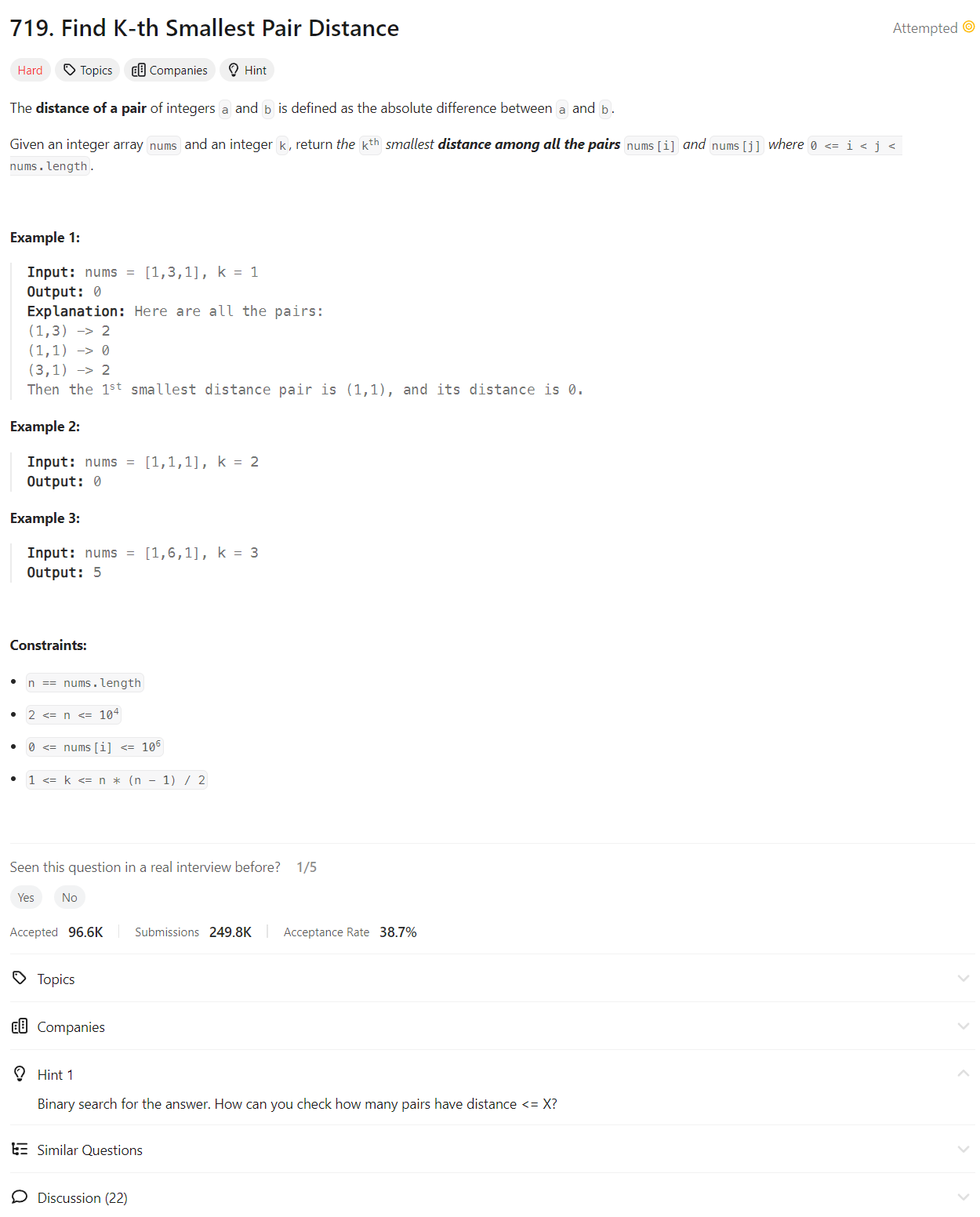Problem Statement

Brute Force - TLE
class Solution:
def smallestDistancePair(self, nums: List[int], k: int) -> int:
N = len(nums)
min_heap = []
for i in range(N - 1):
for j in range(i + 1, N):
distance = abs(nums[i] - nums[j])
heapq.heappush(min_heap, distance)
res = 0
while k > 0 and min_heap:
res = heapq.heappop(min_heap)
k -= 1
return res
class Solution:
def smallestDistancePair(self, nums: List[int], k: int) -> int:
nums.sort()
N = len(nums)
max_heap = []
for i in range(N - 1):
for j in range(i + 1, N):
distance = abs(nums[i] - nums[j])
heapq.heappush(max_heap, -distance)
if len(max_heap) > k:
heapq.heappop(max_heap)
return -max_heap[0]
Editorial
Approach 1: Bucket Sort - TLE
class Solution:
def smallestDistancePair(self, nums: List[int], k: int) -> int:
list_size = len(nums)
# Find the maximum element in the list
max_element = max(nums)
# Initialize a bucket list to store counts of each distance
distance_bucket = [0] * (max_element + 1)
# Populate the bucket list with counts of each distance
for i in range(list_size):
for j in range(i + 1, list_size):
# Compute the distance between nums[i] and nums[j]
distance = abs(nums[i] - nums[j])
# Increment the count for this distance in the bucket
distance_bucket[distance] += 1
# Find the k-th smallest distance
for dist in range(max_element + 1):
# Reduce k by the number of pairs with the current distance
k -= distance_bucket[dist]
# If k is less than or equal to 0, return the current distance
if k <= 0:
return dist
return -1 # Return -1 if no distance found, should not reach here
Approach 2: Binary Search + Dynamic Programming (DP)
class Solution:
def smallestDistancePair(self, nums, k):
nums.sort()
array_size = len(nums)
# Highest element in the sorted array
max_element = nums[-1]
# Maximum possible distance
max_possible_distance = max_element * 2
# Initialize arrays for prefix counts and value counts
prefix_count = [0] * max_possible_distance
value_count = [0] * (max_element + 1)
# Populate prefix count and value count
index = 0
for value in range(max_possible_distance):
while index < array_size and nums[index] <= value:
index += 1
prefix_count[value] = index
for i in range(array_size):
value_count[nums[i]] += 1
# Binary search to find kth smallest distance
left, right = 0, max_element
while left < right:
mid = (left + right) // 2
# Count pairs with distance <= mid
count = self._count_pairs(nums, prefix_count, value_count, mid)
# Adjust binary search bounds based on count
if count < k:
left = mid + 1
else:
right = mid
return left
def _count_pairs(self, nums, prefix_count, value_count, max_distance):
count = 0
array_size = len(nums)
index = 0
while index < array_size:
current_value = nums[index]
value_count_for_current = value_count[current_value]
# Calculate pairs involving current value with distance <= max_distance
pairs_with_larger_values = (
prefix_count[
min(current_value + max_distance, len(prefix_count) - 1)
]
- prefix_count[current_value]
)
pairs_with_same_values = (
value_count_for_current * (value_count_for_current - 1) // 2
)
count += (
pairs_with_larger_values * value_count_for_current
+ pairs_with_same_values
)
# Skip duplicate values
while index + 1 < array_size and nums[index] == nums[index + 1]:
index += 1
index += 1
return count
Approach 3: Binary Search + Sliding Window
class Solution:
def smallestDistancePair(self, nums: List[int], k: int) -> int:
nums.sort()
array_size = len(nums)
# Initialize binary search range
low = 0
high = nums[array_size - 1] - nums[0]
while low < high:
mid = (low + high) // 2
# Count pairs with distance <= mid
count = self._count_pairs_with_max_distance(nums, mid)
# Adjust binary search bounds based on count
if count < k:
low = mid + 1
else:
high = mid
return low
# Count number of pairs with distance <= max_distance using a moving window
def _count_pairs_with_max_distance(
self, nums: List[int], max_distance: int
) -> int:
count = 0
array_size = len(nums)
left = 0
for right in range(array_size):
# Adjust the left pointer to maintain the window with distances <=
# max_distance
while nums[right] - nums[left] > max_distance:
left += 1
# Add the number of valid pairs ending at the current right index
count += right - left
return count
